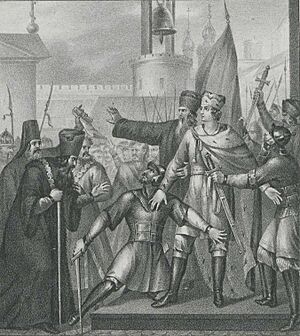Aleksandr Mikhailovich of Tver facts for kids
Quick facts for kids Aleksandr Mikhailovich of Tver |
|
|---|---|

"Prince Alexander of Tver in Pskov", engraving by Boris Chorikov
|
|
| Grand Prince of Vladimir | |
| Reign | 1326–1327 |
| Predecessor | Dmitry of Tver |
| Successor | Alexander of Suzdal |
| Grand Prince of Tver | |
| Reign | 1338–1339 |
| Predecessor | Konstantin of Tver |
| Successor | Konstantin of Tver |
| Prince of Tver | |
| Reign | 1326–1327 |
| Predecessor | Dmitry of Tver |
| Successor | Konstantin of Tver |
| Born | 7 October 1301 Tver |
| Died | 29 October 1339 Sarai, Golden Horde |
| Spouse | Anastasia of Halych |
| Issue | Mikhail II of Tver Maria Uliana of Tver |
| House | Yaroslavichi of Tver |
| Father | Mikhail of Tver |
| Mother | Anna of Kashin |
Alexander Mikhailovich (born October 7, 1301 – died October 29, 1339) was an important prince in medieval Russia. He was the Prince of Tver and Grand Prince of Vladimir from 1326 to 1327. Later, he became Grand Prince of Tver again from 1338 to 1339. His time as ruler is remembered for the Tver Uprising of 1327, a big event where people fought back against the Mongol rulers. Alexander was eventually killed by the Mongols in their capital city, Sarai, along with his son Fyodor.
Contents
Life of Prince Alexander
Early Years and Family
Alexander was the second son of Prince Mikhail of Tver and Anna of Kashin. When he was young, he ruled over smaller areas called appanages, including Kholm and Mikulin.
In 1322, Alexander continued his family's struggle against the growing power of Moscow. He stopped Grand Prince Yury of Moscow as Yury was traveling with tribute money. Yury had previously tricked Alexander's father to get a special document called a yarlyk from the khan of the Golden Horde. The Golden Horde was a powerful Mongol kingdom that ruled over Russia and much of Central Asia during the 13th and 14th centuries.
Becoming Prince
Four years later, Alexander became prince after his older brother, Dmitry of Tver, was killed. Dmitry had been put to death by order of Uzbeg Khan of the Golden Horde. This happened after Dmitry got revenge for his father's death by killing Yury of Moscow.
The Tver Uprising of 1327
In 1327, a Mongol official named Shevkal, who was a cousin of Uzbeg Khan, came to Tver with many followers. They stayed at Alexander's palace and started causing a lot of trouble. They robbed people and made them afraid.
Rumors spread that Shevkal wanted to kill Prince Alexander. People also feared he wanted to take over the throne for himself and force the city to adopt Islam. On August 15, 1327, the Mongols tried to take a horse from a church leader named Dyudko. He called for help, and a large group of angry people attacked the Mongols, killing them all.
Mongol Revenge and Alexander's Flight
This attack on the Mongols led to serious consequences. Some people believe the Mongols might have even caused the incident to get rid of Alexander and the Tver princes.
Ivan Kalita of Moscow, who was the brother of Yury of Moscow (killed by Dmitry), quickly went to the Golden Horde. Before Alexander could explain what happened to Uzbeg Khan, Ivan convinced the khan to give Moscow the yarlyk for the throne of Vladimir. The khan also sent Ivan with a large army of 50,000 soldiers to punish Tver.
Alexander fled with his family to Novgorod, but they were not allowed to stay there because people feared the Mongols. So, Alexander went to Pskov.
Life in Exile
Pskov welcomed Alexander and even made him their prince. Alexander wanted to protect the Russian lands from more destruction. He knew that if he stayed in Pskov, the Mongols would surely send another army to attack the city. So, Alexander agreed to leave Pskov, but the people of Pskov would not let him go.
The head of the Russian Orthodox Church, Metropolitan Feognost, came to Novgorod. He and Archbishop Moisei of Novgorod (who served from 1325–1330 and 1352–1359) officially banned Pskov from church services. This was done at the request of Ivan Kalita. In 1329, following the khan's orders, Ivan Kalita and many other princes declared war on Pskov. Alexander then fled to Lithuania and later to Sweden. After he left, the metropolitan lifted the church ban against Pskov. Alexander returned to Pskov about a year and a half later, with the support of Gediminas, Grand Duke of Lithuania.
Return to Tver and Death
In 1335, Alexander sent his son, Fyodor, to the Golden Horde to ask for forgiveness. Two years later, in 1337, Alexander went there himself. Uzbeg Khan, for a short time, forgave his old enemy and sent him back to Tver. This led to new conflicts with Moscow, which Tver could not win.
On October 29, 1339, Alexander and his son Fyodor were killed in Sarai, the capital city of the Golden Horde. This happened by the orders of Uzbeg Khan.
Family
Alexander married Anastasia of Halych around 1320. They had eight children:
- Fyodor of Tver (died 1339)
- Lev (born 1321, date of death unknown)
- Mikhail II of Tver (1333–1399)
- Vsevolod of Kholm (died 1364)
- Andrey (died 1365)
- Vladimir (died 1365)
- Maria (died 1399), who married Simeon of Russia
- Uliana (around 1325–1392), who married Algirdas
See Also
 | Toni Morrison |
 | Barack Obama |
 | Martin Luther King Jr. |
 | Ralph Bunche |

